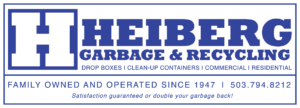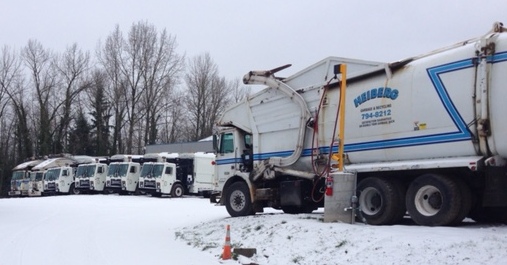Clean Fuels is helping businesses across Oregon succeed. More than 100 companies are already registered with the program, with more than a third of them producing clean fuels for Oregonians. Businesses across Oregon, from Coburg to Sherwood, Klamath Falls to Boardman, and Portland to Medford are using and creating cleaner fuels.
 Take Portland-based Heiberg Garbage & Recycling, LLC as an example. A family-owned waste collection business, Heiberg handles garbage, recycling, yard debris and food waste. The company recently converted part of its fleet to compressed natural gas (CNG). Heiberg operates 35 trucks in total, with 11 powered by compressed natural gas. The company started its conversion with just one CNG truck in 2012. The purchase was costly, and they never envisioned that they would be able to convert an entire fleet. But CNG turned out to be such a good business move that the company changed their mind — installing a fueling station on-site with the capacity to fuel 12 trucks.
Take Portland-based Heiberg Garbage & Recycling, LLC as an example. A family-owned waste collection business, Heiberg handles garbage, recycling, yard debris and food waste. The company recently converted part of its fleet to compressed natural gas (CNG). Heiberg operates 35 trucks in total, with 11 powered by compressed natural gas. The company started its conversion with just one CNG truck in 2012. The purchase was costly, and they never envisioned that they would be able to convert an entire fleet. But CNG turned out to be such a good business move that the company changed their mind — installing a fueling station on-site with the capacity to fuel 12 trucks.
Heiberg has long maintained a strong commitment to sustainability. Prior to converting to CNG, their trucks already operated on clean diesel. “Our trucks drive by, idle, stop and start in front of every customer’s house every week, year around,” says co-owner Bruce Heiberg. “Clean air matters to us and our customers, and converting to CNG reduces our carbon footprint.” CNG is also a good fuel choice for businesses like Heiberg’s. CNG trucks are much quieter than diesel — an added benefit for trucks making frequent stops in neighborhoods sometimes quite early in the morning. Additionally, while diesel is good for vehicles that rack up many highway miles, it’s not ideal for vehicles with frequent stops, like garbage trucks. CNG has helped Heiberg to avoid maintenance issues while also keeping costs low. These cost savings are passed on to their customers through their reasonable rate offerings.
Heiberg’s continued transition to CNG is made possible thanks to two main factors: the incentives offered to businesses that help offset conversion costs (about $30,000 per truck), and the Oregon Clean Fuels Standard. “Clean Fuels enables us to meet our environmental goals more quickly,” says Bruce. “Because of the extra revenue we receive through being a Clean Fuels Standard credit generator, our goal to continue converting our fleet is one we can realize more quickly than we would be able to otherwise.” Programs like Clean Fuels make it easier for small, family-owned businesses like ours to compete and succeed in the marketplace.
CNG pricing is also more reliable than traditional gas. CNG prices don’t spike and plummet, making it easier for businesses like Heiberg to accurately budget fuel costs. As the world oil market looks poised for serious volatility thanks to meddling from Russia and OPEC, locally-made clean fuels like CNG will have more stable prices as well as less pollution, giving businesses and consumers greater protection from oil price spikes. Additionally, fuel diversification helps stabilize prices. When oil prices are too low, production slows, demand and supply sync up, and prices increase again. Dependency on increasingly unconventional sources of oil will also drive prices upward because production costs are larger. Competition and diversification from cleaner fuels encourages local innovation (like Heiberg’s installation of a CNG pump on their own property) and exerts downward pressure on gasoline prices.
Heiberg has blueprints drawn and space set aside to continue expanding their CNG fleet in the future. “It’s an exciting time to be in the alternative fuels market,” Bruce says. “We have dreams for our company’s future, and thanks to the Clean Fuels Standard, these dreams will become a reality sooner rather than later.”
You’d be surprised at the things people put in the garbage! Follow Heiberg’s adventures on Instagram to see another side of Portland!
